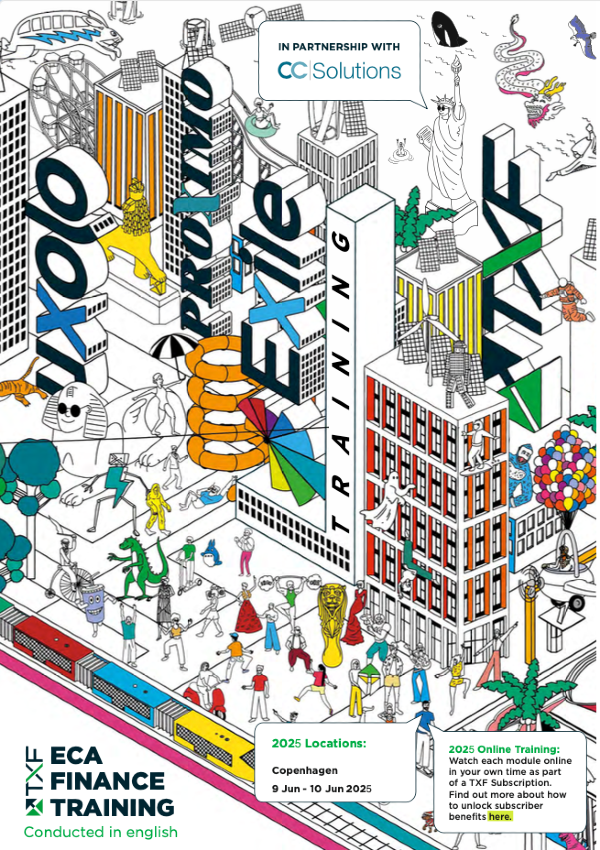Fasten your seatbelts: Trade gets a bumpy night
How do you draw together themes of protectionism, regulation and digitisation? Katharine Morton reflects on her travels of the past two weeks and suggests that, amid the recent hike in US tariffs to China, precautions are needed for turbulent times.

“Fasten your seatbelts, it’s going to be a bumpy night”. Those were the words of Bette Davis in All About Eve. I started writing this crossing the choppy Atlantic on a flight back from New York over the tail of Hurricane Florence, the seatbelt signs had gone on, headwinds had slowed our speed to a paltry 83 knots, and turbulence was on my mind. It’s been an interesting two weeks. I’ve been first in Cape Town where International Trade and Forfaiting Association (ITFA) held its 45th annual international trade and forfaiting conference, and second in New York, where I attended both the SWIFT Business Forum and our own TXF Transformative Trade, Treasury and Supply Chain event.
Three main themes have emerged. One is the sabre-rattling of trade wars. Indeed, the audience poll at our New York event put it as the number one challenge facing the trade finance industry (36%). And sure enough, a bump was provided on 18 September when 10% tariffs were imposed on another $200 billion Chinese goods by the US administration (which could rise to 25% in January on top of the $50 billion goods already hit by levies earlier in the year mainly on aluminium and steel products).
The second is the swinging pendulum of regulation of well-meaning supervisors and regulators in terms of Basel III (IV) and IFRS 9, and the Bankers Association for Finance and Trade (BAFT) private sector initiative together with ITFA rebooting the Master Participation Agreement (MPA), all of which could provide a tonic, or not.
The third is the tentative adoption of technology and how that will affect the real world where people trade. Interestingly, keeping up with the latest technology was seen as the second biggest challenge facing the industry (25% polled in New York), while at the same time, fintech/bank collaboration is expected to make the biggest difference for trade in the next five years by 41% of TXF’s New York audience. Trying to put all of these themes together in a coherent way definitely requires seatbelts on.
Trade wars with sharp or blunt instruments
Let’s start with trade wars. Buckling up means it’s is time to consider what a trade war would be, to identify the battles that are likely and to examine what are now escalating border scuffles and, certainly, a lot of sabre rattling. The flavours now are globalisation, internationalism and nationalism.
What are the weapons? They may be crude: tariffs on all goods between two countries (or trading blocs) or tariffs on all countries of some material commodity or manufactured good. Bluntly the story so far has been ‘push me, shove you’. “If you tariff me, I’ll tariff you” and “I don’t want your steel/automobiles, wine or walnuts in my country.”
They may be more subtle. These used to be classified as ‘non-tariff barriers’, but nowadays can also be a form of virtue signalling. Be they regulation and certification: “Your food is genetically modified, your garments are produced by child labour, your electronic goods are not properly tested and your financial services do not meet our standards of capital adequacy or liquidity.”
These subtle weapons are also popular for domestic political consumption: “foreigners poison us, abuse children, set our cars on fire and threaten another Lehman Brothers 10 years on”. Plus, foreign companies get unfair tax treatment, don’t pay their fair share. Minus, my country gives legitimate tax relief and we get investment and employment. The most difficult weapon is intangible: it may include regulation but extends also to enforceability (“can I rely on your banks to pay, is my intellectual property safe can you mount a cyber-attack on my industries, financial system and even military systems?”).
Then there are the battles. They start at home. Domestic politicians like to rattle sabres abroad because it goes down well with a home audience that is, by definition, more interested in today’s food and next month’s pay check than in something obscure in a country many miles away. A chance remark, an orchestrated lobbying campaign or just a misunderstanding turns rattling into scuffling. Perhaps the most important today concern the US (NAFTA and bilateral relations with other nations, not least China) and the EU (Brexit obviously for Anglophone readers but there is a lot more going on such as the future of the Euro and the EU’s governance structure).
Last, who’s not going to war? Where are the United Nations, metaphorically, in all this? The supranationals (the World Bank Group of World Bank, IMF, MIGA and so on plus the supranational regional development banks), the WTO, the OECD, the Bank for International Settlements (all government funded), the national ECAs and the private international organisations in trade and finance such as the International Chamber of Commerce and SWIFT?
And we should not forget the ‘poor bloody infantry’ in these potential wars: you, gentle reader. Our readers – exporters, importers, banks, insurers whose bread and pay-checks depend on international trade. You have made enormous strides in recent years and the results – which do not make the mainstream headlines – have been impressive. And even more impressive if you consider how globalisation, internationalisation and nationalism works.
Get on with it
It works by good faith and the rule of law. “Uberima fides”, say the insurers: “enforceability” say the lawyers; “Get on with it” say the rest of us. There is a paradox that globalisation or internationalism are still subject to nationalism.
Three excellent presentations at ITFA in Cape Town and several in New York summed up how the globe is still divided between the US and the rest of the world and that all international proposals and initiatives are subject to national interpretation and implementation. Indeed, there are tentative signs that US regulators are becoming cognisant of the need to be more mindful of local regulatory regimes in the future.
Basel IV is in fact a series of revisions to Basel III. It is a work in progress but the aims are set out even if the details are still being worked out, and it is an international accord that needs to be implemented locally. It will affect trade finance in several different ways. The big banks (highlighted as systemically significant) will survive and banks are encouraged to lend to (rated) SMEs and also increase their support for trade finance to (again, rated) SMEs. You might argue that large corporates (many of them running big cash positions) don’t need much support, but it’s food for thought.
And banks will still want to offload their trade finance assets to get them off balance sheet as ‘Basel IV’ appears to stand. But who wants to buy banks’ trade assets other than banks? Indeed, at our New York event, a whopping 42% said the biggest hindrance to the development of trade finance as an asset class for institutional investors is purely a lack of familiarity with trade finance structures. So banks and trade funds (and us) need to get educating.
IFRS 9 has been around in its origins, its proposals and consultations for so many years. The best attempts by the FASB in the US and the IASB have failed to square the circle of different applications.
The MPA, meanwhile, is a proposal to simplify how banks can trade assets. Historically, the differences between US and English law have made transactions difficult to define and enforce. So the new rebooted MPA presents a more logical approach and a practical way forward (the original English law MPA was drafted more than a decade ago). An updated New York law is expected soon. You can’t necessarily square the circle (another squaring of circles) between New York and English law, but it can make things easier.
Adventures in the new normal
Finally, we heard a lot of the role of technology. These are still early days and there is often more fluff than substance in the business. The revolutionary shift is that we are moving from individual transactions to data. We’ll continue to cover all of these developments in TXF’s FIT Zone (www.txfnews.com/FIT). My favourite quote of all the events I’ve been at was in New York when Alisa Di Caprio, head of research at R3 said: “When normal people think about trade, they think about containers of goods moving about, we think about the exchange of data allowing goods to move from one place to another, which is really exciting.”
Despite appearances to the contrary, trade people are normal people too, though. Standardisation will be the precondition behind blockchain, behind AI and for all these buzzy new technologies to gain traction. Standardisation and normalisation remains patchy at best. That’s not to say it won’t happen in trade, after all, UCP and other codes of practice are ubiquitous now. My visit to the SWIFT business forum with all the developments in the take up of global payments innovation (gpi) are encouraging. Visibility and control of cross border payments via SWIFT gpi should be a boon to corporates.
Normalisation of trade wars, of regulation, of technology is happening, so, at the very least, keep your seatbelts loosely fastened at all times.
Exclusive TXF Essentials subscriber content
ECA sanctions cover: Don't get caught out
The reintroduction of US sanctions on Iran has got export financiers questioning the extent of their export credit agencies’ support. What is covered and what is not? The answers are inconsistent and vague.
Ukraine structured trade: Talk is cheaper
Over the past 12 months Ukrainian commodity-linked borrowers have made a comeback in the international debt markets – driving down margins and extending tenors. But it will be the focused and communicative approach to debt service that many have exhibited over the recent crisis that will provide the real long-term benefit.
Bujagali Energy: An unlikely DFI debt rollover template
In July, Sithe and IPS refinanced the Bujagali hydro project to deliver a cheaper power tariff to the Ugandan government. The process – a rare refinancing for DFIs – also involved a reshuffle of Bujagali’s debt and equity cast. So is this the beginning of a new willingness from DFIs to roll over debt?
Global export finance H1 2018: Numbers crunched without the headache
TXF has released its Global export finance results for H1 2018. From Bpifrance performing best in the first half of this year to Oil & Gas showing the largest volumes in export finance, the findings will continue to surprise..
Corporate perspective: 200 pints a second of trade, treasury and risk with Asahi Breweries Europe
When Japanese brewer Asahi bought SABMiller’s central and European assets from AB InBev (ABI) for €7.3bn it made Asahi Group the third largest brewer in Europe. The ABI transaction was one of the most complicated deals in the history of brewing, however one outcome is that Anthony Buchanan, treasurer of the Asahi Breweries Europe Group, which produces 200 pints of premium lager every second, has an interesting job. TXF talks financing international trade with him.
Plus, to top things off...the news you thought you had but don't
Nikola Tesla Airport financing progressing
Vinci Airports Serbia is progressing with the financing for the 25-year Belgrade Nikola Tesla Airport concession. Under the terms of the concession co...
TAPI pipeline to close ECA/DFI deal in Q1 2019
The $7 billion Turkmenistan-Afghanistan-Pakistan-India (TAPI) 1,635km gas pipeline – sponsored by Turkmengaz, Afghan Gas Enterprise, Inter State...
BB Energy launches latest RCF into syndication
BB Energy has launched its latest revolving credit facility (RCF) into syndication. The RCF has a three-year tenor, a first for the independent energy...
ING and SG close another AFIC financing for Ethiopian Airlines
ING Capital and Societe Generale (SG) have executed a $137 million 12-year loan to finance one Boeing 777F aircraft for Ethiopian Airlines Group. The ...
Dammam West ISTP bids in
Water Electricity Company (WEC) has opened the bids for the Dammam West independent sewage treatment PPP project. Of the seven bidders a consortium...
Blankenburg tunnel nears close on tightly priced debt
Sponsors of the €800 million ($934 million) Blankenburg tunnel PPP in the Netherlands – Macquarie (70%), Ballast and DEME (15% each) &ndash...
Tilt raises debt for Dundonnell wind project
Tilt Renewables has secured terms for the debt it needs to back its A$560 million ($398 million) 336MW Dundonnell wind project in Victoria. The projec...
Bpifrance eyes Havana Airports PPP financing
Sponsors of the Havana Airport and San Antonio Airport PPP in Cuba – Groupe ADP, TAV Airports and Bouygues Batiment International – are cu...
More details on Ophir Energy's Santos acquisition bridge
More details have emerged on Ophir Energy's $130 million acquisition bridge facility. Designed to finance Ophir's $205 million buy-out of...
Reliance signs tightly priced $500m SACE-backed loan
Reliance Industries signed a $500 million untied SACE-backed loan on 7 August. Proceeds will be used for general corporate purposes. However, under th...
Seven prequalify for Indonesia satellite PPP
Indonesia’s Ministry of Communication and Information Technology has pre-qualified seven bidders for its IDR7.72 trillion ($522 million) multifu...
Metalloinvest extends maturities on debts
Metalloinvest has completed an amendment on its $1.05 billion 2017 PXF with tighter pricing and extended maturity. The amendment was signed on 17 Augu...





